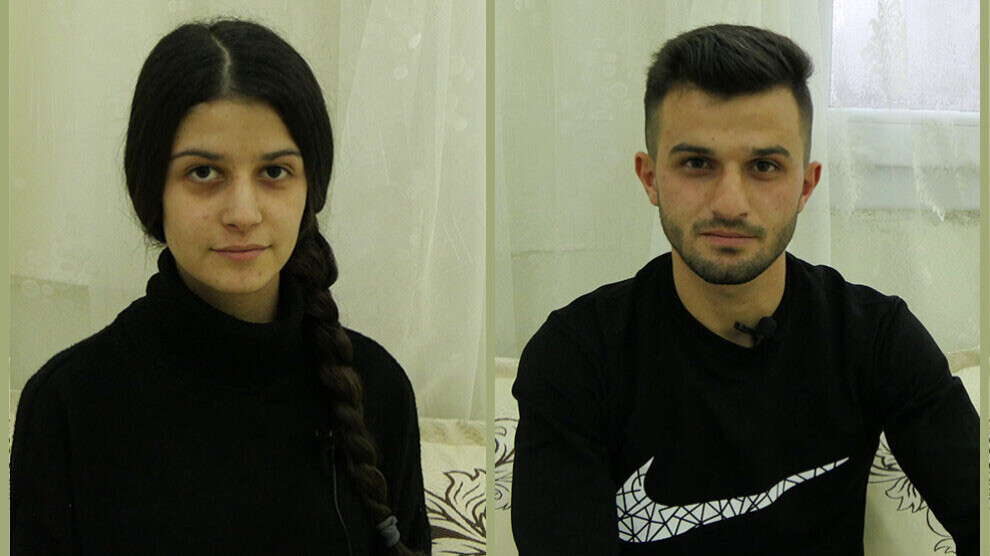Roboski: A wound not healing
The Roboski massacre was carried out on 28 December 2011. It left deep wounds and shaped the victims' relatives lives. Cansel and Muammer Encü speak about life after the massacre.
The Roboski massacre was carried out on 28 December 2011. It left deep wounds and shaped the victims' relatives lives. Cansel and Muammer Encü speak about life after the massacre.

On 28 December 2011, Turkish war planes attacked a group of civilians near the village of Roboski in the northern Kurdistan province of Uludere (Qilaban), Şırnak. 34 young people from the village of Roboski were killed while on a cross-border trading journey.
This massacre provoked great indignation among Kurds around the world. Many people were arrested and imprisoned during protests against the massacre in Turkey and Northern Kurdistan. However, those who were most cruelly affected by the aftermath of the massacre are the people of Roboski. The relatives of the victims suffer from severe trauma. The wounds left by the massacre have not even remotely healed after nine years.
The moment when family members saw the torn bodies of their loved ones represented a rupture in the lives of the people of the entire village. The children of 2011 are today in the prime of their youth. Two of them are siblings Cansel and Muammer Encü. The siblings, who had already lost their older sisters in an accident in 2003, suffered another huge blow in 2011 when their older brother was also taken away from them.
The massacre affected our entire life
When asked if they wanted to do an interview with ANF, they answer: "If it adds anything to the fight for justice, why not?" Both Cansel and Muammer not only lost their older brother in the massacre, but also friends, cousins and close relatives. They emphasize again and again how the massacre became something permanent in every area of their life.
For example, the Encü siblings were very good at school before the massacre, after which their performance dropped massively. “When I went to class I had trouble concentrating because I was thinking about my brother all the time,” said Muammer. He emphasized that he could not overcome this feeling throughout high school.
Muammer was playing video games at home on the evening of the massacre. When he heard the noise of the war planes and then the explosions, he got very frightened.
While speaking he underlined time and time again that he was "a child". It is like trying to explain that he is now an adult and has left the fear of the night of 28 December 2011 behind.
At the same time, he speaks of serious psychological problems from which he suffered ever since the massacre. He said: "I was a child back then" and added: "That night I couldn't do anything other than pray that nothing had happened to my brother."
The moment his mother returned from the border area where the massacre took place and hugged him tightly, Muammer realized that his brother was dead. From that moment on, the second part of his life began. In addition to the pain of his sister's death years ago, there was now the pain for the loss of his big brother. At the age of 12, Muammer, like all other children in Roboski, witnessed a mass murder.
I always think about my brother
Muammer said that he and his brother loved each other very much and that his school days in particular had been negatively affected by this. “I was very bad at school because I wasn’t able to get my brother out of my head. I just finished high school. After that I had no strength to continue.” Muammer, who previously dreamed of university, failed his exams after the massacre. For Muammer, his brother is not dead. He keeps asking himself: “How old would he be now?”, “Would he be small or big?” Or “Would he have married and children?”
The older he got, the more burning is for him the pain of his brother's death. He insists that whatever happens, he will never give up the fight for justice and will eventually achieve that the killers are brought to justice.
I wanted to become a lawyer to bring the responsible of the massacre to court
Cansel was only nine years old at the time of the massacre. Two months after the massacre, she didn't want to go to school at all. Her murdered brother was often taking her to school, and the memory was too painful. When she said "I started to hate school," the pain returned to her eyes these days. She added: “Whenever I thought of that night, feelings of hatred and anger grew in me. Because then I couldn't do anything. "
Cansel decided to become a lawyer. As a lawyer in the Roboski case, she wanted to bring to responsible of the massacre to justice and thus at least alleviate the suffering of their relatives a little. But on the other hand, she thought that as a Kurdish woman she would end up in exactly the same vicious circle after graduation. After the Constitutional Court's decision to dismiss the case on Roboskîi, Cansel continued her education and put the plan to become a lawyer back on the agenda. "The perpetrators must be punished" Every year, on 27 December, Cansel thinks about the moments before her brother died. Every year she thinks about the fact that the bombs would fall the following day. She says: “Every 28 December I feel like I'm reliving that night. Therefore it is my only wish that this procedure will continue and that the perpetrators will be punished."
All young people in Roboski have the same wounds and signs of suffering of Cansel and Muammer. They fight for justice together with their families. They have become very politicized and live in the hope that one day the Turkish state will be held accountable for its massacres.